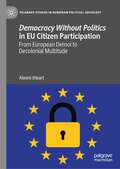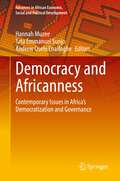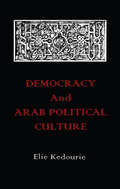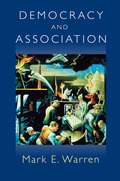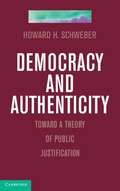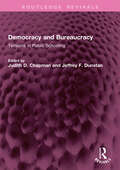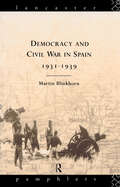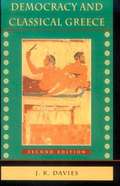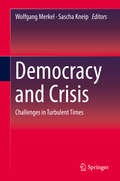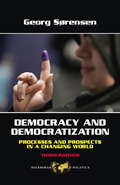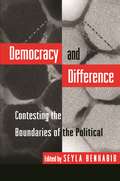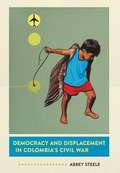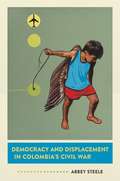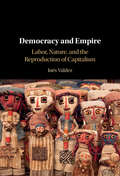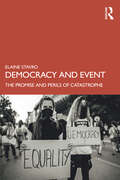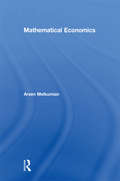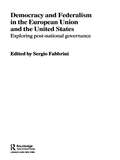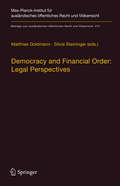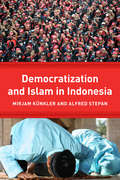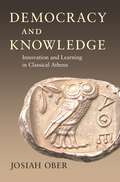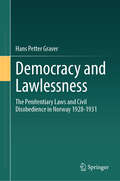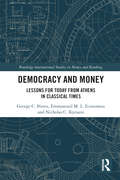- Table View
- List View
Democracy Without Politics in EU Citizen Participation: From European Demoi to Decolonial Multitude (Palgrave Studies in European Political Sociology)
by Alvaro OleartHow does the dominant understanding(s) of the demo(i)cratic subject in the EU, and of democracy more broadly, shape the EU’s democratic innovations on ‘citizen participation’? What are the politically and normatively preferable alternatives, both in terms of the conceptualisation of the democratic subject in the EU and in the ensuing political practices? The book addresses these questions combining a political theory with a political sociology perspective, contrasting the ‘democracy without politics’ approach of the EU in the context of the Conference on the Future of Europe with that of ongoing transnational activist processes. In doing so, it develops an agonistic alternative to ‘the people(s)’ as the political imaginary of democracy in the EU, which is based on the idea of the ‘decolonial multitude’. Thus, the book puts forward a diagnosis of current debates on EU democratic legitimacy as well as proposing an alternative.
Democracy and Africanness: Contemporary Issues in Africa’s Democratization and Governance (Advances in African Economic, Social and Political Development)
by Hannah Muzee Tata E. Sunjo Andrew EnaifogheThis book examines the governance and democratization process in Africa, its history, trends, and prospects. Written by a diverse panel of experts, the book provides an intersectional and interdisciplinary analysis of Africa’s democratic environment. Chapters cover topics such as the evolution of democracy in Africa, electoral politics, gender, activism, human rights, and cultural diversity. Critically assessing the fit of democracy for African countries and offering strategies for the Africanization of democracy, this volume will be important for researchers and students interested in African politics, postcolonial theory, democracy, and governance.
Democracy and Arab Political Culture
by Elie KedourieExcept for Israel, the Middle East remains largely untouched by the democratic revolution that swept across Eastern Europe and the former USSR. This book aims to explain and analyze the reasons why despotism or religious fundamentalism continue to control the Middle Eastern countries.
Democracy and Association
by Mark E. WarrenTocqueville's view that a virtuous and viable democracy depends on robust associational life has become a cornerstone of contemporary democratic theory. Democratic theorists generally agree that issue networks, recreational associations, support circles, religious groups, unions, advocacy groups, and myriad other kinds of associations enhance democracy by cultivating citizenship, promoting public deliberation, providing voice and representation, and enabling varied forms of governance. Yet there has been little work to show how and why different kinds of association have different effects on democracy--many supportive but others minimal or even destructive.This book offers the first systematic assessment of what associations do and don't do for democracy. Mark Warren explains how and when associational life expands the domain, inclusiveness, and authenticity of democracy. He looks at which associations are most likely to foster individuals' capacities for democratic citizenship, provoke political debate, open existing institutions, guide market activities, or bring democratic decision-making to new venues. Throughout, Warren also considers the trade-offs involved, noting, for example, that organizational solidarity can dampen internal dissent and deliberation even as it enhances public deliberation. Blending political and social theory with an eye to social science, Democracy and Association will draw social scientists with interests in democracy, political philosophers, students of public policy, as well as the many activists who fortify the varied landscape we call civil society. As an original analysis of which associational soils yield vigorous democracies, the book will have a major impact on democratic theory and empirical research.
Democracy and Authenticity
by Howard H. SchweberIn Democracy and Authenticity Professor Howard Schweber examines a basic problem for liberal democracies. When a political entity is characterized by a multitude of identities and values, certain constraints apply to reasons for citizens and public officials to justify coercive political actions. The author argues that justifications based on particular religious doctrines are not a proper basis for government actions that affect everyone. He then develops a concept of public justification intended to guide citizens in a liberal democracy through the work of creating policies that satisfy their responsibilities to one another.
Democracy and Bureaucracy: Tensions in Public Schooling (Routledge Revivals)
by Judith D. Chapman Jeffrey F. DunstanFirst published in 1990, Democracy and Bureaucracy examines the tensions associated with the reorganization of public education in Australia. Contributors explore these tensions through a variety of related antimonies: bureaucracy and democracy, control and autonomy, centralism and devolution. The thesis generally propounded in this book is that democratic structures, participation and school-based decision-making are all elements of school improvement which enable a bureaucracy to be more responsive, less authoritarian, and in control only over the macro issues of policy, thereby leaving to schools the maximum degree of freedom possible for their own determination of principles, policies and practices. This book will be of interest to students of education, pedagogy, public policy and public administration.
Democracy and Civil War in Spain 1931-1939 (Lancaster Pamphlets)
by Martin BlinkhornIn the 1930s Spain underwent a period of intense and bloody upheaval that culminated in three years of civil war and the triumph of the Nationalist rebels under General Franco. Hundreds of thousands of Spanish - and non-Spanish - people died in their struggle against what was seen as the greatest evil of the time: fascism and its commitment to the defeat of democracy. Fifty years on, with the coming of a new democracy to Spain, previously inaccessible research materials have become available to historians; old orthodoxies have been challenged and the continuing debate concerning the origins of the Spanish Civil War has been lively. In the light of this renewed interest Martin Blinkhorn has provided a lucid and readable introduction to events in Spain in the 1930s.
Democracy and Crisis: Challenges In Turbulent Times
by Wolfgang Merkel Sascha KneipIn light of the public and scholarly debates on the challenges and problems of established democracies, such as a lack of participation, declining confidence in political elites, and the deteriorating capabilities of democratic institutions, this volume discusses the question whether democracy as such is in crisis. On the basis of the shared concept of embedded democracy, it develops a range of conceptual approaches to empirically analyzing the challenges of democracy and their potential transformation into crisis phenomena. The book is divided into three parts, the first of which highlights various aspects of political participation, such as political inequality in voting. In turn, Part II focuses on problems of political representation, while Part III assesses whether processes such as globalization, deregulation, and the withdrawal of the state from important policy areas have limited the political control and legitimacy of democratically elected governments.
Democracy and Democratization
by Georg SorensenWhat is democracy? What are the pitfalls and the positive potentials in the growing trend toward democratization? This book examines the prospects for democracy in the world today and frames the central dilemma confronting all states touched by the process of democratization. Georg Sørensen clarifies the concept of democracy, shows its application in different contexts, and questions whether democratic advancement will continue-and if so, at what price. The consequences of democracy for economic development, human rights, and peaceful relations among countries are illuminated in both their positive and negative aspects. This third edition includes an entirely new chapter on the promotion of democracy from the outside which covers current issues of state building in Iraq. Further revisions include updates to the section on the prospects of democracy in today’s world, an extended discussion of the economic performance of recently democratized countries, and an evaluation of the possibilities for further democratic consolidation. There are also new case studies, examples, and anecdotes to illustrate historical as well as contemporary instances of democratic transition. Democracy, as Sørensen convincingly portrays it, is a value in itself as well as a potential promoter of peace, prosperity, and human well-being. But democracy is not inevitable, and actions at every level-from the individual to the international-are necessary to ensure that frail or #147;frozen” democracies do not flounder and that established democracies flourish.
Democracy and Democratization
by Georg SorensenWhat is democracy? What are the pitfalls and the positive potentials in the growing trend toward democratization? This book examines the prospects for democracy in the world today and frames the central dilemma confronting all states touched by the process of democratization. Georg Sørensen clarifies the concept of democracy, shows its application in different contexts, and questions whether democratic advancement will continue-and if so, at what price. The consequences of democracy for economic development, human rights, and peaceful relations among countries are illuminated in both their positive and negative aspects. This third edition includes an entirely new chapter on the promotion of democracy from the outside which covers current issues of state building in Iraq. Further revisions include updates to the section on the prospects of democracy in today's world, an extended discussion of the economic performance of recently democratized countries, and an evaluation of the possibilities for further democratic consolidation. There are also new case studies, examples, and anecdotes to illustrate historical as well as contemporary instances of democratic transition. Democracy, as Sørensen convincingly portrays it, is a value in itself as well as a potential promoter of peace, prosperity, and human well-being. But democracy is not inevitable, and actions at every level-from the individual to the international-are necessary to ensure that frail or "frozen" democracies do not flounder and that established democracies flourish.
Democracy and Difference: Contesting the Boundaries of the Political
by Seyla BenhabibThe global trend toward democratization of the last two decades has been accompanied by the resurgence of various politics of "identity/difference." From nationalist and ethnic revivals in the countries of east and central Europe to the former Soviet Union, to the politics of cultural separatism in Canada, and to social movement politics in liberal western-democracies, the negotiation of identity/difference has become a challenge to democracies everywhere. This volume brings together a group of distinguished thinkers who rearticulate and reconsider the foundations of democratic theory and practice in the light of the politics of identity/difference. In Part One Jürgen Habermas, Sheldon S. Wolin, Jane Mansbridge, Seyla Benhabib, Joshua Cohen, and Iris Marion Young write on democratic theory. Part Two--on equality, difference, and public representation--contains essays by Anne Phillips, Will Kymlicka, Carol C. Gould, Jean L. Cohen, and Nancy Fraser; and Part Three--on culture, identity, and democracy--by Chantal Mouffe, Bonnie Honig, Fred Dallmayr, Joan B. Landes, and Carlos A. Forment. In the last section Richard Rorty, Robert A. Dahl, Amy Gutmann, and Benjamin R. Barber write on whether democracy needs philosophical foundations.
Democracy and Displacement in Colombia's Civil War
by Abbey SteeleDemocracy and Displacement in Colombia’s Civil War is one of few books available in English to provide an overview of the Colombian civil war and drug war. Abbey Steele draws on her own original field research as well as on Colombian scholars’ work in Spanish to provide an expansive view of the country’s political conflicts. Steele shows how political reforms in the context of Colombia’s ongoing civil war produced unexpected, dramatic consequences: democratic elections revealed Colombian citizens’ political loyalties and allowed counterinsurgent armed groups to implement political cleansing against civilians perceived as loyal to insurgents.
Democracy and Displacement in Colombia's Civil War
by Abbey SteeleDemocracy and Displacement in Colombia’s Civil War is one of few books available in English to provide an overview of the Colombian civil war and drug war. Abbey Steele draws on her own original field research as well as on Colombian scholars’ work in Spanish to provide an expansive view of the country’s political conflicts. Steele shows how political reforms in the context of Colombia’s ongoing civil war produced unexpected, dramatic consequences: democratic elections revealed Colombian citizens’ political loyalties and allowed counterinsurgent armed groups to implement political cleansing against civilians perceived as loyal to insurgents.Combining evidence collected from remote archives, more than two hundred interviews, and quantitative data from the government’s displacement registry, Steele connects Colombia’s political development and the course of its civil war to purposeful displacement. By introducing the concepts of collective targeting and political cleansing, Steele extends what we already know about patterns of ethnic cleansing to cases where expulsion of civilians from their communities is based on nonethnic traits.
Democracy and Empire: Labor, Nature, and the Reproduction of Capitalism
by Inés ValdezDemocracy and Empire theorizes the material basis of popular sovereignty via the Black radical tradition. Popular sovereignty contains an affective attachment to wealth, secured through collective agreements to dominate others, i.e., self-and-other-determination. Inés Valdez expands on racial capitalism by theorizing its Anglo-European-based popular politics, which authorize capital accumulation enabled by empire and legitimated by racial ideologies. This stunts political projects in the Global South. Valdez masterfully outlines how social reproduction is provided by racialized others who sacrifice families and communities, and how the political alienation from nature in wealthy polities is mediated by technology and enabled by a joint devaluation of nature and manual labor performed by racialized others. The book concludes with a theorization of anti-imperial popular sovereignty based on political relations that encompass nature. This title is part of the Flip it Open Programme and may also be available Open Access. Check our website Cambridge Core for details.
Democracy and Event: The Promise and Perils of Catastrophe
by Elaine StavroCatastrophes unsettle our safe places within the world. As such, they provide an interesting site to analyze the intersection of our affective and political lives. Bringing radical democratic thinking, affect theory, psychoanalysis, and discursive analysis to bear on contemporary catastrophic events, Democracy and Event presents a fresh perspective on the study of affect and its impact on democratic sensibilities and practices. Situated in different countries with differing institutional histories and cultures – the Grenfell Tower fire in London, England (2017); the SARS epidemic in Toronto, Canada (2003); the Parkland shooting in Florida (2018); the early days of the COVID-19 crisis and the murder of George Floyd in Minneapolis, USA (2020) – Elaine Stavro interprets the rhetoric, discourse, and affective communication of politicians and passionate protestors. She examines their linkages to well-established organizations informed by democratic ideals, as well as the context in which they arise, which have a bearing on their ability to challenge neoliberal and authoritarian practices. Inspired by the urgent need to bring theory back to politics and politics back to theory, Elaine Stavro demonstrates how theory might inform our attitudes to contemporary events while recognizing that political action and events cannot be captured in their complexity by theory. Her skillful engagement with various theoretical approaches, read through the lens of catastrophic events, will speak to a wide-ranging scholarly readership in numerous academic fields.
Democracy and Famine (Routledge Research in Comparative Politics)
by Olivier RubinFamine is the most extreme manifestation of the existence of poverty, inequality and political apathy. Whereas poverty, hunger and diseases are not easily eradicated in the world today, famines are often perceived to be relatively simple to avert. However, the political incentives to prevent famines are not always present. Inspired by the work of Amartya Sen, whose influential hypothesis that democratic institutions together with a free press provide effective protection from famine, Democracy and Famine is a study combining qualitative and quantitative evidence, analysing the effect of democracy on famine prevention. The book’s overall framework moves from placing political systems at the heart of famine protection to look at the political processes involved. Using a case study based approach drawing on famines from India, Malawi and Niger; Democracy and Famine will be of interest to scholars and students of democracy, comparative politics and international relations.
Democracy and Federalism in the European Union and the United States: Exploring Post-National Governance
by Sergio FabbriniThe European Union - a supranational system with its own institutional characteristics and autonomy - has a structure and functional logic which are more similar to those of the US than those of European nation states. Yet, by and large, the EU and the US tend to be analyzed more as potential geopolitical and economic rivals or allies than compared as institutional peers. By bringing together some of the most influential political scientists and historians to compare the European and American experiences of federalism, Democracy and Federalism in the European Union and the United States explores the future development, and seeks a better understanding, of a post-national European Union democracy. This book consists of three core parts: how the EU has developed and the implications of the process of European federalization the features of American federalism, tracing the intellectual debate that led to the approval of the American federal constitution in 1787 the future of European Union. This is essential reading for all students of European politics, democracy and international relations.
Democracy and Financial Order: Legal Perspectives (Beiträge zum ausländischen öffentlichen Recht und Völkerrecht #273)
by Matthias Goldmann Silvia SteiningerThis book discusses the relationship between democracy and the financial order from various legal perspectives. Each of the nine contributions adopts a unique perspective on the legal and political challenges brought to the fore by the Global Financial Crisis. This crisis and the ensuing sovereign debt crisis in Europe are only the latest in a long series of financial crises around the globe in recent decades. By their very existence, but also as a result of the political turmoil they have created, these financial crises testify to the well-known tensions between democracy and a market-based economic and financial order. However, what is missing in this debate is an analysis of the role of law for reconciling democracy with a market-based financial order. To fill this lacuna, the book focuses on the controversy surrounding the concept of law, thereby adding another variable to the debate on the relation between democracy and capitalism. Each chapter addresses the concept of law from a particular theoretical angle, be it a full-grown legal theory or an approach in political economy that has a particular view of the law.
Democracy and Islam in Indonesia (Religion, Culture, and Public Life #13)
by Alfred Stepan Eds. Künkler MirjamIndonesia's military government collapsed in 1998, igniting fears that economic, religious, and political conflicts would complicate any democratic transition. Yet in every year since 2006, the world's most populous Muslim country has received high marks from international democracy-ranking organizations. In this volume, political scientists, religious scholars, legal theorists, and anthropologists examine the theory and practice of Indonesia's democratic transition and its ability to serve as a model for other Muslim countries. They compare the Indonesian example with similar scenarios in Chile, Spain, India, and Tunisia, as well as with the failed transitions of Yugoslavia, Egypt, and Iran. Essays explore the relationship between religion and politics and the ways in which Muslims became supportive of democracy even before change occurred, and they describe how innovative policies prevented dissident military groups, violent religious activists, and secessionists from disrupting Indonesia's democratic evolution. The collection concludes with a discussion of Indonesia's emerging "legal pluralism" and of which of its forms are rights-eroding and rights-protecting.
Democracy and Its Discontents: Reflections On Every Day America
by Daniel J. BoorstinLectures on the character of the democracy which has evolved in America.
Democracy and Its Elected Enemies
by Steven Rosefielde Daniel Quinn MillsDemocracy and its Elected Enemies reveals that American politicians have usurped their constitutional authority, substituting their economic and political sovereignty for the people's. This has been accomplished by creating an enormous public service sector operating in the material interest of politicians themselves and of their big business and big social advocacy confederates to the detriment of workers, the middle class and the non-political rich, jeopardizing the nation's security in the process. Steven Rosefielde and Daniel Quinn Mills contend that this usurpation is the source of America's economic decline and fading international power, and provide an action plan for restoring 'true' democracy in which politicians only provide the services people vote for within the civil and property rights protections set forth in the constitution.
Democracy and Knowledge: Innovation and Learning in Classical Athens
by Josiah OberWhen does democracy work well, and why? Is democracy the best form of government? These questions are of supreme importance today as the United States seeks to promote its democratic values abroad. Democracy and Knowledge is the first book to look to ancient Athens to explain how and why directly democratic government by the people produces wealth, power, and security. Combining a history of Athens with contemporary theories of collective action and rational choice developed by economists and political scientists, Josiah Ober examines Athenian democracy's unique contribution to the ancient Greek city-state's remarkable success, and demonstrates the valuable lessons Athenian political practices hold for us today. He argues that the key to Athens's success lay in how the city-state managed and organized the aggregation and distribution of knowledge among its citizens. Ober explores the institutional contexts of democratic knowledge management, including the use of social networks for collecting information, publicity for building common knowledge, and open access for lowering transaction costs. He explains why a government's attempt to dam the flow of information makes democracy stumble. Democratic participation and deliberation consume state resources and social energy. Yet as Ober shows, the benefits of a well-designed democracy far outweigh its costs. Understanding how democracy can lead to prosperity and security is among the most pressing political challenges of modern times. Democracy and Knowledge reveals how ancient Greek politics can help us transcend the democratic dilemmas that confront the world today.
Democracy and Lawlessness: The Penitentiary Laws and Civil Disobedience in Norway 1928-1931
by Hans Petter GraverThe book addresses efforts to politically influence and curb the judicial system, by telling the story of the enactment of controversial laws in Norway in 1927. It draws parallels to current challenges to the autonomy of the legal order, both in countries where populist forces seek control over the courts, and in other countries where increasing levels of conflict, such as around the climate crisis and the pandemic, challenge the rule of law. In 1927 the Norwegian Parliament enacted three laws that changes the rules of the game in the relation between Labor and Capital. The law was weaponized in benefit of the employers. By this, the legislature departed from the classic ideal of equality before the law and law’s autonomy as a neutral order. The new laws were called the penitentiary laws. The demonstrations against one of the laws, the Arbitration Act in 1928 were the largest manifestation of civil disobedience in Norwegian history. They provoked a level of lawlessness that has not been matched, with exception of the situation during the German occupation 1940-1945. The book analyses the events with the aid of the theory of civil disobedience in liberal democracies put forward by the philosopher John Rawls and the theory of the legal complex developed by the socio-legal scholars Terence Halliday, Lucien Karpic, and Malcolm Feeley. This book tells the story of the Penitentiary Laws, how the laws came into being, how they were received and resisted, and how they were defeated through civil disobedience and with the support of a legal complex which reached far into the legal system. The outcome of the conflict may be one of the factors that explain the high level of trust that the legal institutions enjoy in present day Norway.
Democracy and Money: Lessons for Today from Athens in Classical Times (Banking, Money and International Finance)
by George C. Bitros Nicholas C. Kyriazis Emmanouil M. EconomouThe authors of this book argue that post-war fiscal and monetary policies in the U.S. are prone to more frequent and more destabilizing domestic and international financial crises. So, in the aftermath of the one that erupted in 2008, they propose that now we are sleepwalking into another, which under the prevailing institutional circumstances could develop into a worldwide financial Armageddon. Thinking ahead of such a calamity, this book presents for the first time a model of democratic governance with privately produced money based on the case of Athens in Classical times, and explains why, if it is conceived as a benchmark for reference and adaptation, it may provide an effective way out from the dreadful predicament that state managed fiat money holds for the stability of Western-type democracies and the international financial system. As the U.S. today, Athens at that time reached the apex of its military, economic, political, cultural, and scientific influence in the world. But Athens triumphed through different approaches to democracy and fundamentally different fiscal and monetary policies than the U.S. Thus the readers will have the opportunity to learn about these differences and appreciate the potential they offer for confronting the challenges contemporary democracies face under the leadership of the U.S. The book will find audiences among academics, university students, and researchers across a wide range of fields and subfields, as well as legislators, fiscal and monetary policy makers, and economic and financial consultants.
